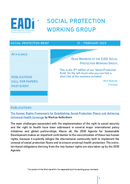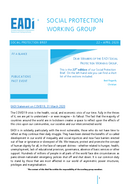Social Protection
Extending social protection in low and middle income countries has gained a historically unique prominence on the international development agenda. Likewise, social protection has been increasingly rooted during the last 20 years in national policy agendas in many low- and middle-income countries as well. Researchers and practitioners agree today that reducing the vulnerability of people to basic risks such as bad health, work-disability, old-age, unemployment or harvest failure is not only important for social but also economic and political reasons. Social protection is an effective instrument to reduce income poverty but also to progress in the fight against other dimensions of multidimensional poverty (access to education, health services and sanitation). Moreover, social protection can contribute to decreasing income inequality and to encouraging poor households to invest into human capital and other productive assets and thereby escape from poverty by themselves. Social protection would thus be a means to promote growth, in particular among the poor and informal sector employees. Finally, social protection among other factors could foster social inclusion and social cohesion, nurturing the feeling that all citizens belong to and are supported by society.
The research agenda on social protection encompasses at least three broad areas of inquiry: (1) Assessing the impact of social protection measures, (2) Analysing options for designing and financing social protection schemes, and (3) Understanding national and international political dynamics of social protection reforms, i.e. understanding the political economy of reforms.
Advances in understanding have been made in all three areas, but many questions are still open for discussion. Examples are:
1. There is need for greater evidence on the effects that social protection schemes have on the social, economic and political development. For example, there is still significant scope for assessing the effects of different social protection schemes on households’ savings and asset accumulation, their risk taking capacity as well as on investment in productive activities.
Furthermore, we need to analyse to which extend social cohesion in communities increases or decreases due to social protection, particularly cash transfers.
2. We also need to have a better understanding as to how social protection schemes should be designed so that the social, economic and political impact is maximized. What factors impact on the design and implementation of sound social protection policies? Which international and constitutional legal requirements have to be taken into consideration? In particular, it is important to know more about the impact of context-specific factors such as for example the prevailing institutional and political system on the relative effectiveness of social protection schemes.
3. Further, from political economy perspective more insights are needed regarding the dynamics of change. What role do different political institutions or socio-economic factors (such as for example income, income distribution, demographic characteristics) play in explaining change? To what extent are social protection systems shaped and should they be shaped by the norms and values that prevail in a society? Which legal rules and principles govern the legislative procedure and the administrative implementation processes?
The working group aims at exchanging information and discussing ongoing research related to social protection. It also aims at linking up to research institutions in non-European countries in order to contribute to a global dialogue in social protection. Researchers dealing with social protection in high income countries and interested in an international exchange are also welcome to join.
Social protection prevents and reduces poverty. It features prominently on international and national policy agendas worldwide, which is also indicated by the Sustainable Development Goals with 5 out of 17 goals directly referring to social protection.
What are the core topics?
The research agenda on social protection encompasses at least three broad areas of inquiry: (1) Assessing the impact of social protection measures, (2) Analysing options for designing and financing social protection schemes, and (3) Understanding national and international political dynamics of social protection reforms, i.e. understanding the political economy of reforms.
What are our aims? What do we want to achieve as a Working Group?
The working group aims at exchanging information and discussing ongoing research related to social protection. The Working Group further aims at linking up to research institutions in non-European countries in order to contribute to a global dialogue in social protection. Researchers dealing with social protection in high income countries and interested in an international exchange are also welcome to join.




